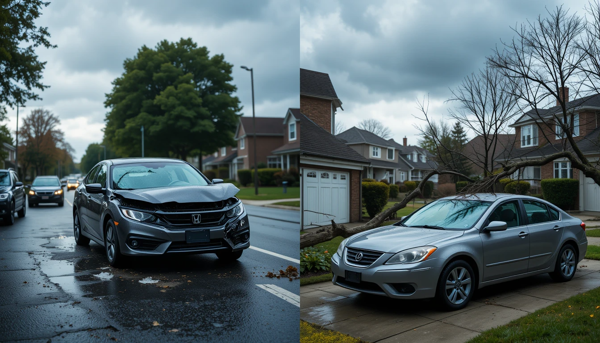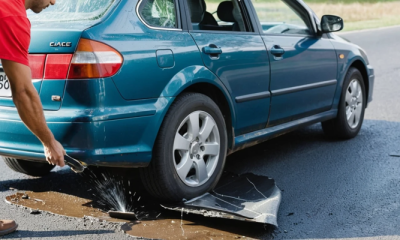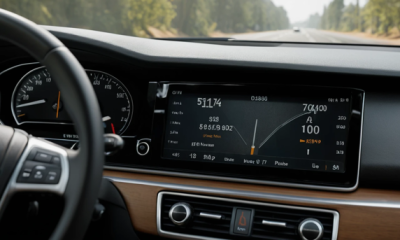Auto Insurance
Comprehensive vs Collision Insurance: Clear Guide for Peace of Mind

Comprehensive vs collision insurance—understand the real difference, what each covers, and which one is best for you. Simple and clear!
🚗 What Is Comprehensive vs Collision Car Insurance?
Ever wondered what your car insurance really covers?
If you’re like most drivers, you’ve heard the terms comprehensive and collision tossed around in car insurance talks—but honestly, do you know what they actually mean? More importantly, do you know which one you really need?
You’re not alone. Many people buy coverage without fully understanding what they’re paying for—and whether it’s the right protection for their vehicle, lifestyle, or budget.
Let’s break it down in plain English—no confusing jargon, no fine print traps. Just a real, honest comparison between comprehensive and collision insurance so you can make the best decision for you.
🚘 What Is Comprehensive Insurance?
Comprehensive insurance covers damage to your car from things other than a crash with another vehicle.
Think: freak accidents, natural disasters, and random acts of bad luck.
It typically covers:
- Theft
- Vandalism
- Fire 🔥
- Falling objects (like a tree branch)
- Floods or hail storms ⛈️
- Animal collisions (yes, even deer 🦌)
💡 Comprehensive = “everything except a regular crash.”
💥 What Is Collision Insurance?
Collision insurance kicks in when your car is damaged in an accident—whether it’s your fault or not.
This includes:
- Hitting another car 🚗💥🚙
- Crashing into a tree, pole, or fence
- Your car rolling over
💡 Collision = “you hit something, or something hits you.”
✅ At a Glance: What Each One Covers
Here’s a quick snapshot to help you compare:
| Scenario | Covered by Comprehensive | Covered by Collision |
|---|---|---|
| Your car is stolen | ✅ Yes | ❌ No |
| You hit a parked car | ❌ No | ✅ Yes |
| A hailstorm dents your hood | ✅ Yes | ❌ No |
| You hit a deer on the highway | ✅ Yes | ❌ No |
| Someone keys your car | ✅ Yes | ❌ No |
| You back into a tree | ❌ No | ✅ Yes |
💸 Which Coverage Is Required by Law?
Here’s the thing: neither nor is required by law.
Yep, you read that right.
The only insurance you’re usually required to carry by law is liability insurance. It pays for damage you cause to others. But if you’re financing or leasing your car, the lender will likely require both comprehensive and collision.
🧠 Think of It Like This…
Imagine your car is a smartphone 📱.
- Collision coverage is like fixing your screen after you drop it.
- Comprehensive coverage is like replacing it if it gets stolen or run over by a lawn mower.
Different problems, different solutions.
🚗 Who Really Needs Comprehensive Coverage?
Let’s be real: not everyone needs comprehensive insurance.
You should consider it if:
- You live in an area prone to severe weather
- Car theft is common where you live
- You park outside often
- You drive through wildlife-heavy areas
Bonus Tip: If your car is newer or high-value, comprehensive is a smart investment.
🛠️ Who Should Get Collision Coverage?
Collision insurance makes sense if you:
- Own a newer vehicle you can’t afford to replace
- Drive often in traffic-heavy areas
- Have a history of fender benders
- Want peace of mind after a mistake
If your car is older and not worth much? You might be better off skipping it.
💰 What Does Each Type of Coverage Cost?
Here’s a general comparison of how much you might pay annually:
| Coverage Type | Average Annual Cost |
|---|---|
| Comprehensive | $160–$250 |
| Collision | $300–$450 |
💡 Collision usually costs more because accidents are more common than theft or weather damage.
🧾 Do I Have to Get Both?
Not at all. You can mix and match based on your needs.
Examples:
- Have an old car you don’t care much about? Just go with liability.
- Have a newer car but live in a low-risk area? Maybe skip collision.
- Want max protection? Get both.
It’s all about risk vs reward.
🔍 When Should You Drop Coverage?
Let’s say your car’s market value drops below $1,000. Paying $500 a year for coverage might not be worth it.
Ask yourself:
- What’s the deductible?
- What’s your car actually worth?
- Could you afford to repair or replace it on your own?
If the math doesn’t make sense, it might be time to drop extra coverage.
🧮 How to Calculate Your Break-Even Point
Here’s a helpful table to decide if coverage is worth it:
| Car Value | Deductible | Annual Premium (Both) | Worth It? |
|---|---|---|---|
| $10,000 | $500 | $600 | ✅ Yes |
| $3,000 | $1,000 | $550 | ❌ No |
| $7,000 | $500 | $700 | ✅ Yes |
💡 If the premium + deductible is close to your car’s value, it’s probably not worth keeping.
🛑 What’s NOT Covered by Either?
Here’s what neither will cover:
- Mechanical breakdowns 🔧
- Regular wear and tear (tires, brakes, etc.)
- Personal items stolen from your car
- Medical bills from injuries (that’s medical or PIP)
Always check your policy so you’re not caught off guard!
🪪 How Deductibles Work
Your deductible is the amount you pay before insurance kicks in.
Example:
If you have a $500 deductible and the repair cost is $2,000, your insurer pays $1,500.
Higher deductible = lower monthly premiums, but more out-of-pocket when something happens.
📊 Pros and Cons of Each Type
| Coverage | Pros | Cons |
|---|---|---|
| Comprehensive | Covers rare but expensive events | May not be needed for old cars |
| Collision | Helps after accidents, regardless of fault | Higher premium |
🧩 Can You Use One Without the Other?
Yes, you can have comprehensive without collision and vice versa.
Some drivers carry just comprehensive to protect against theft or weather, if they rarely drive. Others skip comprehensive but keep collision if they drive in high-traffic areas.
It’s flexible—pick what makes sense for your situation.
🔑 Which Coverage Is Better?
There’s no universal “better” option.
It really depends on:
- The value of your car
- Your driving habits
- Where you live
- Your budget and risk tolerance
The best coverage is the one that protects you from the financial surprises you’re most likely to face.
✨ Conclusion: Make the Right Choice for You
Car insurance doesn’t have to be hard. Now you know:
- Comprehensive = random damage (not collisions)
- Collision = crash-related damage
- Neither is legally required—but both are smart, depending on your needs
- Choose based on your car’s value, your risk exposure, and your budget
Be honest about your lifestyle and driving habits. Do you live in a city with lots of traffic? Or in the country where deer love to run across the road? Are break-ins common in your area? Your answers will help you choose the right protection.
At the end of the day, insurance should give you peace of mind—not confusion.
❓ FAQs: Comprehensive vs Collision Insurance
What does comprehensive insurance actually cover?
It covers non-collision damage like theft, fire, weather, vandalism, and hitting animals.
Is collision insurance worth it for an older car?
Not always. If your car’s value is low, the cost of collision might outweigh the benefit.
Can I just have comprehensive without collision?
Yes. You can choose one, both, or neither depending on your needs and car value.
Does comprehensive insurance cover hitting a deer?
Yes. Animal collisions are covered under comprehensive, not collision.
What happens if I only have liability coverage?
You’ll pay out of pocket for any damage to your car. Liability only covers others.
🔗 References
https://www.nerdwallet.com/article/insurance/comprehensive-vs-collision-insurance
https://www.policygenius.com/auto-insurance/comprehensive-vs-collision-coverage/
https://www.progressive.com/answers/comprehensive-vs-collision-insurance/
-

 Care & Repairs3 weeks ago
Care & Repairs3 weeks agoHandling Vehicle Damage after an Accident: Smart Repair Tips for Peace of Mind
-

 Auto Parts3 weeks ago
Auto Parts3 weeks agoCheapest Online Store For Car Parts – Best Deals Guaranteed
-

 Auto Parts4 weeks ago
Auto Parts4 weeks agoFind Auto Parts Using VIN Number – Fast & Easy Method Today!
-

 Auto Parts3 weeks ago
Auto Parts3 weeks agoUsed Auto Parts with Warranty: Smart, Reliable & Budget-Friendly!






